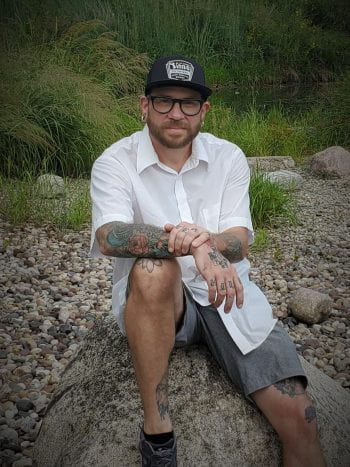
Harvey Galler is a Prison Education Project (PEP) alumnus and WashU student who is pursuing a Bachelor of Science in Political Science through the WashU School of Continuing & Professional Studies. Harvey graduated with his Associate in Liberal Arts in May 2019. In addition to being a full-time student, Harvey is an intern with PEP, co-chair of the PEP Alumni Program, and co-founder of the STL Reentry Fund, a mutual aid fund that supports formerly incarcerated people in the St. Louis community.
As co-chair of the PEP Alumni Program, Harvey works in concert with the PEP program. The mission of the PEP Alumni Program is “to help create a community that supports the transition of students that are in PEP program back into St. Louis community and provides resources that might be missing, including housing and job resources.” Harvey is also the co-founder of a mutual aid fund for formerly incarcerated people in the St. Louis community: “It’s a fund that’s completely funded by community. We get all of our money from the community and use it to help formerly incarcerated individuals with financial assistance. We meet once a week to decide which applications we can fund and redistribute funds to them – and we have faith that they use the money for what they need it for.”
My past experience is exactly why I’m doing what I’m doing. Resources either aren’t there in the community or they are there but hard to find, and they have limited funding themselves. There’s a big need for this in the community. What better way for someone who has these same experiences to help others that need help by putting them in connection with resources that I know exist.
As if he is not busy enough, Harvey is also a full-time UCollege student. Harvey expressed that he’s found the transition to remote learning since the start of the pandemic challenging: “It was a difficult transition, and there’s a lot more work involved. My world isn’t social media or on the internet, and it definitely wasn’t while I was in prison. I didn’t have a computer at all and hadn’t been on a computer in five years before PEP brought in computers. Then I’m coming out and going to school and having to use a computer. Suddenly all my learning was on the computer. I have to constantly remind myself that I have to check my discussion board. It doesn’t feel that engaging because the conversations are like texts and don’t feel as personal.”
There are a lot of conversations happening in higher education institutions about how to make colleges and universities more diverse, inclusive places. What people are recognizing and acknowledging is it’s not enough for people to have a seat at the table; they need to be in leadership positions. “PEP has allowed us access to these positions and provided opportunities for leadership. I do wish that there could be more hands-on leadership roles in the program before you get out so when you get out and you do get involved, you understand the formalities of how things work. PEP does have a student council, but it’s limited, and there aren’t a whole lot of opportunities. WashU is welcoming for the most part, but it’s a foreign environment to a lot of our culture. You do feel like an imposter on campus as a formerly incarcerated individual.”
Harvey defines equity in education as “equal opportunities and access to education for everyone.” He notes that the cost of education is an important factor that often makes it inaccessible to low-income communities: “Lowering the cost of education is one way of make it accessible. Additionally, in places where there are education institutions, make them accessible to poorer communities by having satellite campuses in these communities.” Harvey also mentioned that even for students who do enroll at WashU, there are certain obstacles that pose barriers to obtaining their education. For example, “WashU has a shuttle bus that’s free to students, but how far does that shuttle bus actually go?”
When asked about the challenges PEP and other higher education programs face, Harvey listed money as one of the biggest challenges, both to PEP and other programs: “You need stable access to money to help build the program and help continue to offer the same amount of services year to year.” To overcome this challenge, Harvey proposed awareness as one of the biggest factors: “Awareness that the program exists and the benefits of the program in the community. Awareness that the money isn’t going to ‘waste’ on people who don’t deserve it. I think there’s a big misconception about PEP, where the money goes in PEP, and the personalities of the people that the money is being spent on.” Over the next 5-10 years, Harvey hopes to see the Alumni Program grow and expand and establish a foothold in the local community. He would also like to see PEP expand into other institutions in the area, particularly women’s prisons and county jails to reach people before they end up in prison.